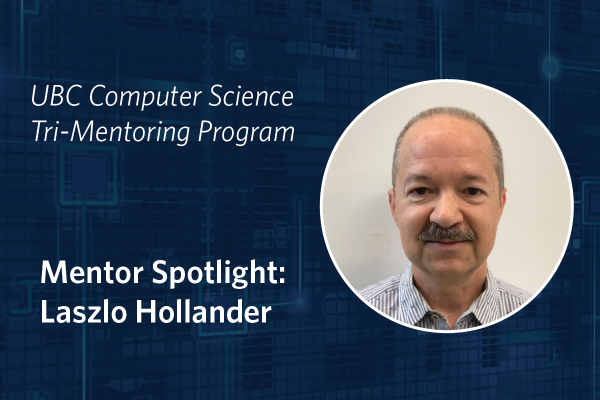
Mentor Spotlight: Laszlo Hollander
UBC Computer Science has been running its award-winning Tri-Mentoring Program since 2001. To celebrate the program’s 25th anniversary next year, the department is launching a “Mentor Spotlight” series, highlighting the various mentors who have provided over 3300 students with immeasurable advice and help over the years.
The first mentor highlighted in our series is Laszlo Hollander, a UBC Computer Science alum (BSc ‘02) and the Director of IT Infrastructure at Emily Carr University of Art + Design. He has been a mentor in UBC Computer Science’s Tri-Mentoring Program for over 22 years and is the program’s most long-standing mentor. In this interview, he shares his motivation behind becoming a mentor and his experience in the program.
This interview has been edited and condensed for clarity.
What inspired you to get into mentoring?
I saw the difference in my life when I entered the computer science field as a mature student. I had two people who were advising me on my career and one of them, Dr. George Tsiknis, was absolutely fantastic. That experience highlighted to me the fact that a student needs a mentor who understands where they're coming from and can give them practical life advice to survive. That was the drive for me to become a mentor in this program — it’s giving back. When I help somebody and they come back and thank me for the advice, that makes me feel like I’m making a difference.
What makes a good mentor?
Knowing that everybody is different and needs different types of mentorships. A mentor should be flexible and listen to you and your story. They need to tailor their advice based on the person and customize the mentorship.
What do you enjoy most about being a mentor?
Being there for the students. How often they want to meet, the type of communication, how they reach out to me — it's all up to them. I'm here to help the students get better at what they're doing and what they want to accomplish. I'm happy to advise them based on my life experiences.
Years later, I’m hearing from students about how the mentorship made a big difference in their lives. I remember distinctly that there was one person I mentored and five years later, he took me to a restaurant and brought his parents with him and said, “This is the guy who helped me and is the reason why I’m here right now!” So it gives me confirmation that I’m doing that right thing, that I’m adding value to people’s lives and professional development.
What do many of the students come to you for advice about?
It's a broad spectrum. A lot of advice is about resume writing, interview skills and preparing for an interview. I make it a point to let them know, especially when they're in their first or second year, to join the Co-op Program. It's invaluable. If they cannot join Co-op, I encourage them to get a second job that is related to their field of specialty so when they graduate, they're going to have a leg up. Sometimes the Co-op term turns into a full-time job. Those are the things that I highlight most of the time.
I advise them more about people skills than technical skills. I am happy to dig into that too, but what they're learning now and what I learned back when I graduated in 2002 are totally different.
What is your mentorship philosophy?
We're a family, not a business. A business is all about generating profit, but a family is about helping each other and making sure that everybody is doing fine. I encourage students to enjoy what they do even if they earn less because they’re going to be happier.
I always tell my mentees that even though the mentorship is a year, they can reach out to me anytime. It’s not like once we finish the year, I don’t want to hear from them again. It’s up to them if they want to keep the mentorship going. I have people coming back years later to ask me to help with interviews, for example.
What do mentors and mentees need to know to get the most out of their mentorship experience?
Mentors have to be fully honest and open about what the mentorship is about and set expectations. I think that's extremely important. Trust is earned, and you cannot expect them to open up right away and tell their deepest challenges and struggles that they have — you just have to let them be and just reinforce the fact that you're here to help them and eventually they will come around.
For mentees, they have to be honest with themselves and with the mentor. I know it might be very difficult because if they don't trust their mentor, they're not going to talk about certain things, but they should approach it as they’ve signed up for a reason — what is that reason? So they have to come prepared and know what it is that they're trying to get out of this experience.